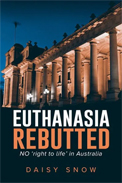
 |
Centered around the Euthanasia Law in Australia, Snow’s work is an incredibly comprehensive and multidimensional examination of what the “right to die” truly means and to whom it is applicable. From the Catholic perspective and the Arabic approach to Aristotle and Hercules references, the author is unyielding in her desire to inspire discussion at a global level. On a personal level, the author notes that she herself would have become a victim of euthanasia had it not been for her letter to the parliament.
As Snow identifies the types of euthanasia (e.g., assisted, voluntary, nonvoluntary, active, passive), her mission is to create awareness of how the legislation against euthanasia can backfire, leading to a total loss of life, dignity, and one’s humanness. Approaching the work from a metaphysical perspective, Snow delves into concepts such as karmic debt while demonstrating how this euthanasia movement could have colossal implications, the likes of which haven’t been seen since the Holocaust of Nazi Germany. Whether it’s those suffering from mental health or youth who are unable to make decisions for themselves, Snow continually outlines and decries the policies that allow the vulnerable to make decisions that are driven significantly by the pain they are presently in.
Though the sentence structure in this work is simple, it is clear and comprehensible, written in a third-person point of view intended to maintain objectivity while exclusively focusing on the facts and introducing examples that unequivocally demonstrate the flaws of euthanasia policies. For instance, while perusing the globe, the author denotes that in the Netherlands, one can be as young as twelve to get parental consent. Ultimately, the work does an adept job of providing historical context in conjunction with contemporary examples to deliver thought-provoking commentary on a rising global issue.